The Xeon Entry Quad-Core CPU Review: Xeon E-2174G, E-2134, and E-2104G Tested
by Ian Cutress on March 11, 2019 10:30 AM EST- Posted in
- CPUs
- Xeon
- Enterprise CPUs
- Coffee Lake
- Xeon E
- C246
CPU Performance: Encoding Tests
With the rise of streaming, vlogs, and video content as a whole, encoding and transcoding tests are becoming ever more important. Not only are more home users and gamers needing to convert video files into something more manageable, for streaming or archival purposes, but the servers that manage the output also manage around data and log files with compression and decompression. Our encoding tasks are focused around these important scenarios, with input from the community for the best implementation of real-world testing.
All of our benchmark results can also be found in our benchmark engine, Bench.
Handbrake 1.1.0: Streaming and Archival Video Transcoding
A popular open source tool, Handbrake is the anything-to-anything video conversion software that a number of people use as a reference point. The danger is always on version numbers and optimization, for example the latest versions of the software can take advantage of AVX-512 and OpenCL to accelerate certain types of transcoding and algorithms. The version we use here is a pure CPU play, with common transcoding variations.
We have split Handbrake up into several tests, using a Logitech C920 1080p60 native webcam recording (essentially a streamer recording), and convert them into two types of streaming formats and one for archival. The output settings used are:
- 720p60 at 6000 kbps constant bit rate, fast setting, high profile
- 1080p60 at 3500 kbps constant bit rate, faster setting, main profile
- 1080p60 HEVC at 3500 kbps variable bit rate, fast setting, main profile
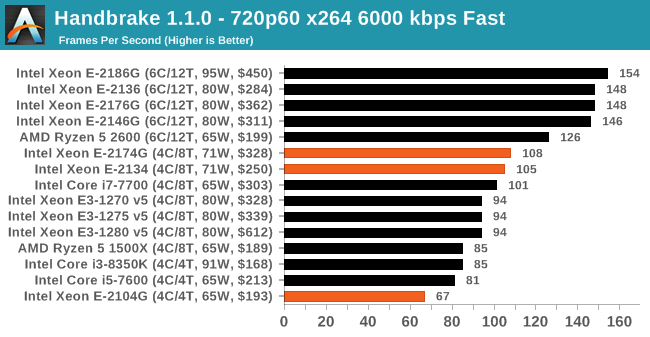
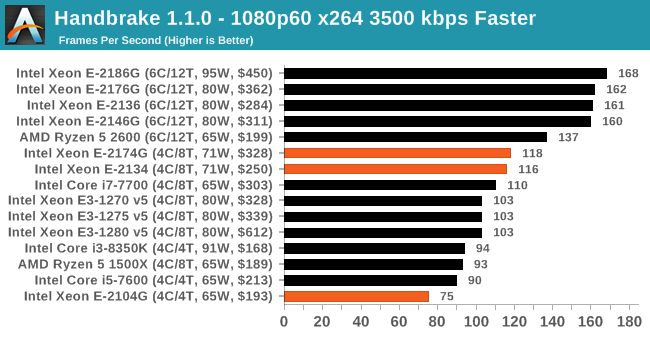
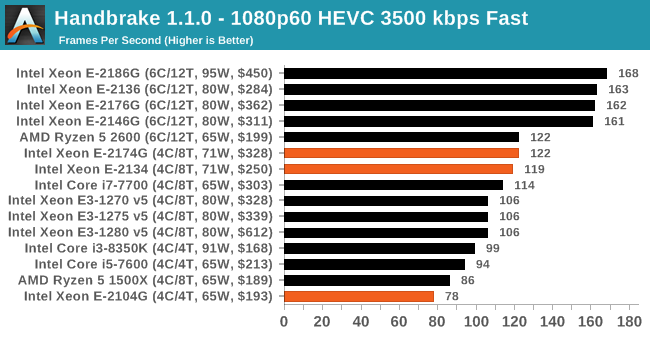
7-zip v1805: Popular Open-Source Encoding Engine
Out of our compression/decompression tool tests, 7-zip is the most requested and comes with a built-in benchmark. For our test suite, we’ve pulled the latest version of the software and we run the benchmark from the command line, reporting the compression, decompression, and a combined score.
It is noted in this benchmark that the latest multi-die processors have very bi-modal performance between compression and decompression, performing well in one and badly in the other. There are also discussions around how the Windows Scheduler is implementing every thread. As we get more results, it will be interesting to see how this plays out.
Please note, if you plan to share out the Compression graph, please include the Decompression one. Otherwise you’re only presenting half a picture.
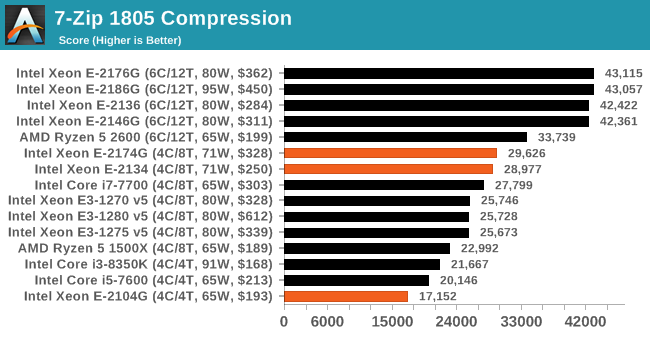
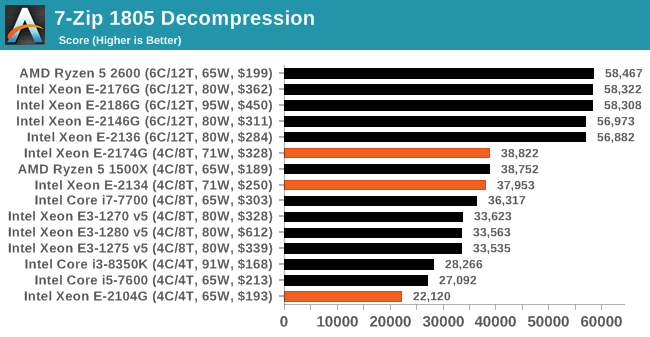
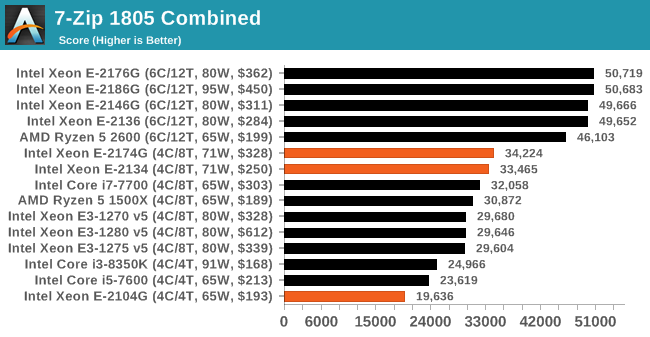
WinRAR 5.60b3: Archiving Tool
My compression tool of choice is often WinRAR, having been one of the first tools a number of my generation used over two decades ago. The interface has not changed much, although the integration with Windows right click commands is always a plus. It has no in-built test, so we run a compression over a set directory containing over thirty 60-second video files and 2000 small web-based files at a normal compression rate.
WinRAR is variable threaded but also susceptible to caching, so in our test we run it 10 times and take the average of the last five, leaving the test purely for raw CPU compute performance.
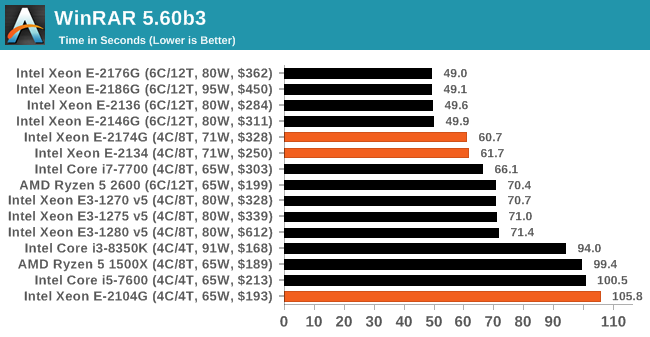
AES Encryption: File Security
A number of platforms, particularly mobile devices, are now offering encryption by default with file systems in order to protect the contents. Windows based devices have these options as well, often applied by BitLocker or third-party software. In our AES encryption test, we used the discontinued TrueCrypt for its built-in benchmark, which tests several encryption algorithms directly in memory.
The data we take for this test is the combined AES encrypt/decrypt performance, measured in gigabytes per second. The software does use AES commands for processors that offer hardware selection, however not AVX-512.
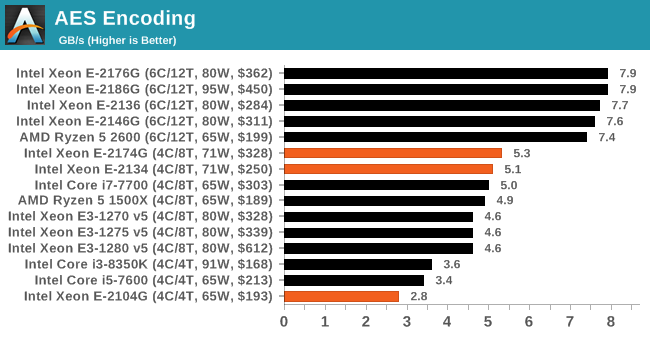










29 Comments
View All Comments
mode_13h - Monday, March 11, 2019 - link
Those interested in ECC-support should also consider Intel's Core i3 CPUs. Most of those also support ECC. Do check their site, to be certain:https://ark.intel.com/content/www/us/en/ark/search...
mode_13h - Monday, March 11, 2019 - link
Also, it should go without saying that you need to pair it with a motherboard with ECC support.mode_13h - Monday, March 11, 2019 - link
For instance, compare the E-2174G with the i3-8350K:https://ark.intel.com/content/www/us/en/ark/compar...
eastcoast_pete - Monday, March 11, 2019 - link
Thanks Ian! While I know that my following suggestion might be overly simple, I like to also look at the value for money, especially for business tech like that. To do so, I simply divide the benchmarks by the price, resulting in performance/$ . If nothing else, it makes it easier to compare hardware that is at least within a certain range. Doing that, the Ryzen 2600 is the overall price/performance champion, whereas the Xeon 2146G is the likely choice if more speed and other features become important. I don't see much upside in the premium four core (2174G) over the (cheaper and usually faster ) six core 2146G.eastcoast_pete - Monday, March 11, 2019 - link
This didn't make it into my comment:Question @Ian: I saw you mention the performance /price once in your article, but is there a way to show that" Bang for the Buck" in a summary graph? I believe it might help put things into perspective, especially when comparing CPUs or GPUs where the most expensive costs 2-3 times as much as the cheapest.
msroadkill612 - Tuesday, March 12, 2019 - link
The 2600 is on sale for 7 days at newegg for $165, but it seems the going regular price for it atm.msroadkill612 - Tuesday, March 12, 2019 - link
TLDR,but buyers should also consider cooling and mobo relative costs also. afaik, many, if not all intels have no cooler, whereas tha amd included ones are regarded as qyute decent if not overclocking.peevee - Tuesday, March 19, 2019 - link
What a terrible mess the whole Intel lineup is.bimuzubi - Sunday, December 8, 2019 - link
Definitely, but here the power envelope is important for the test, which Anandtech doesn't seem to give. It's quite worrisome how most of those Xeons are operating outside of their power envelope, that E-2174G that you are referring to is pulling 85W for a rated 71W, so Intel gives a P2 power limit. Why bother with the normal TDP then? The 2600 seems to be owning price/performance and TDP/performance. Question there is EEC memory support, and the guarantee/testing including with Xeons https://adultpornroll.com/category/asian-porn-tube... . That's why I mentioned including TR in the benchmarks, or at least the 2700X.